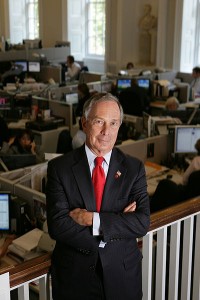Before Mayor Bloomberg absolutely refused to fucking leave after his second term was up and changed election laws to allow him to buy a third term, he did some popular things. The most popular may be initiating the 311 system, whereby NYC residents had to dial just three quick digits to lodge complaints and find out info about anything they wanted to know about their city. It reduced bureacracy and gave people a reliable bridge to their government.
What wasn’t fully anticipated at the time was that the information coming in with these calls might be more useful than the information going out. By tagging complaints and questions to particular areas, the city has become better equipped to solve problems, large and small. Steven Johnson has an interesting article in Wired on the topic, entitled “What A Hundred Million Calls to 311 Reveal Aboiut New York.” An excerpt:
“As useful as 311 is to ordinary New Yorkers, the most intriguing thing about the service is all the information it supplies back to the city. Each complaint is logged, tagged, and mapped to make it available for subsequent analysis. In some cases, 311 simply helps New York respond more intelligently to needs that were obvious to begin with. Holidays, for example, spark reliable surges in call volume, with questions about government closings and parking regulations. On snow days, call volume spikes precipitously, which 311 anticipates with recorded messages about school closings and parking rules.
But the service also helps city leaders detect patterns that might otherwise have escaped notice. After the first survey of 311 complaints ranked excessive noise as the number one source of irritation among residents, the Bloomberg administration instituted a series of noise-abatement programs, going after the offenders whom callers complained about most often (that means you, Mister Softee). Similarly, clusters of public-drinking complaints in certain neighborhoods have led to crackdowns on illegal social clubs. Some of the discoveries have been subtle but brilliant. For example, officials now know that the first warm day of spring will bring a surge in use of the city’s chlorofluorocarbon recycling programs. The connection is logical once you think about it: The hot weather inspires people to upgrade their air conditioners, and they don’t want to just leave the old, Freon-filled units out on the street.
The 311 system has proved useful not just at detecting reliable patterns but also at providing insights when the normal patterns are disrupted. Clusters of calls about food-borne illness or sanitary problems from the same restaurant now trigger a rapid response from the city’s health department. And during emergencies, callers help provide real-time insight into what’s really happening. ‘When [New York Yankees pitcher] Cory Lidle crashed his plane into a building on the Upper East Side, we had a bulletin on all of our screens in less than an hour explaining that it was not an act of terrorism,’ [Executive Director Joseph] Morrisroe says. After US Airways flight 1549 crash-landed in the Hudson in 2009, a few callers dialed 311 asking what they should do with hand luggage they’d retrieved from the river. ‘We have lots of protocols and systems in place for emergencies like plane crashes,’ Morrisroe explains, ‘but we’d never thought about floating luggage.’ This is the beauty of 311. It thrives on the quotidian and predictable—the school-closing queries and pothole complaints—but it also plays well with black swans.”
Tags: Cory Lidle, Joseph Morrisroe, Mayor Bloomberg, Steven Johnson


